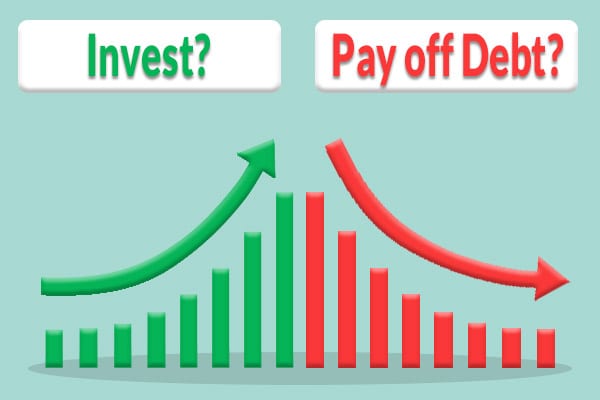The stock market is setting records every week, which creates a real temptation for people in debt. Every time you turn on the TV there are ads for everything from financial firms that will guide your money to the perfect investment, to phone apps that make investing easy with a couple quick swipes.
You don’t want to miss out, but you have debt – credit cards, student loans, maybe a mortgage. You may wonder, which is the better financial move – investing or paying off debt?
The two financial moves are apples and oranges.
“For most people, debt is a separate function from investment,” Lucia Dunn, a professor of economics at Ohio State University, said. “Investments carry risks that need to be considered.”
Investing money, particularly in the stock market, doesn’t guarantee you will make money, or even how much you will make. Dunn said that most economists would advise a person in the median income range not to deviate from their normal repayment patterns for debt obligations in order to invest.
That said, investing while paying off debt, or paying off debt, then investing, may still be a good move.
Should You Pay Off Credit Cards or Invest?
If you’re considering investing, “It always makes sense to pay off the debt with the highest interest charges first,” Dunn said.
That means credit cards. Credit card interest rates in 2021 average about 16.65%. The lower your credit score, the higher your interest rates. If you don’t pay the cards off every month, you might be closer to 30%.
Despite the fluctuation, credit card interest rates are a lot easier to predict that the stock market. While there are crazy highs and lows on stocks and mutual funds, the average rate of return on stock investing over the past several decades is 8-to-10% a year. The average credit card interest rate, on the other hand, has steadily risen and in recent years has been between 16 and 18%.
So, it’s better to pay off high-interest credit cards, or at least lower the interest rates, before spending money on investing.
One way to get rates down is to get your credit score up, which means making payments on time and lowering your “utilization rate” (how much credit you’re allowed vs. how much you use).
If that seems hard to do on your own, you may want to consider a debt management program or debt consolidation.
Debt Management Plan
A debt management plan with a nonprofit credit counseling agency consolidates credit card debt and lowers the amount of interest you’re paying on it. You make one affordable monthly payment to the agency, to eliminate credit card debt. The agency distributes the money to your lenders at an agreed-upon rate that pays off the debt in 3-5 years. Your credit score improves as payments are made on time and the amount you owe shrinks. Debt management plans come with a monthly administrative fee of $30-$50.
Debt Consolidation to Improve Credit
Debt consolidation involves getting a loan that has lower interest and using it to pay off your credit cards. The loan can be secured, meaning you use an asset, like your house, as collateral to get a lower interest rate. Or it can be an unsecured personal loan, which has no collateral, but a higher interest rate. If your debt consolidation loan has a lower interest rate than the average return on investment, you may want to start investing the money that would normally be going to pay that high interest.
Should You Pay Off Student Loans or Invest?
Most people who take out student loans borrow through the federal program, which has fixed interest rates between 2.75% and 5.3%. Private student loans have more of a range, as high as 12.99% for fixed and 11.98% for variable, which means the rate can change for better or worse.
Because of the COVID-19 pandemic, the federal government has put a pause on collecting student loan payments until at least October 2021, and interest won’t accrue during that period. Borrowers can still pay if they want to, with the entire payment being applied to reducing the principal during the 0% interest period.
There is no such pause on private loans – it’s up to the lender, and payments can change suddenly for those with variable interest.
Many experts urge borrowers to pay back their loans, and to take advantage of the no interest period if they can to get the principal down. While there’s no guaranteed return on investments, there is one on paying back loans, particularly paying more than the principal.
Should You Pay Off Your House or Invest
The average 30-year mortgage rate, with points, was 3.08% for those with excellent credit scores in 2021. Mortgage rates tend to be much lower than the rate on return for investments. On top of it, paying a mortgage is one of the surest investments you can make.
The longer you pay, the more equity you have in your home. Assuming you make payments on time, a mortgage is a tremendous boost to your credit score and history.
“(Mortgages) not only usually carry a low interest rate, but gradually becomes an asset over time and can be used as collateral to finance other things down the road, like children’s education,” Dunn said. “So, paying off a mortgage at the usual rate makes sense unless a person suddenly gets a windfall – like winning the lottery.”
Should You Use Investments to Pay Off Debt?
Investments are a way to build financial security in the long term and most economic experts stress that the idea is to let them build, ignoring fluctuations and looking at the end goal.
When investing, it’s important to assess the risk, something that all investments have, to make sure you’re not going to lose money. “Even conservative, insured investments, such as certificates of deposit (CDs) issued by a bank or credit union, come with inflation risk,” the Financial Industry Regulatory Association (FINRA) warns. “They may not earn enough over time to keep pace with the increasing cost of living.” FINRA says that the best investments, those most likely to have a return, are the ones that have the long game in mind.
Debt, on the other hand, is a barrier to financial security. Tackling short-term problems shouldn’t come at the expense of long-term stability.
Dunn, the economics professor, says, “Becoming debt free is good, but this goal should be balanced against the need to save and invest for retirement.”
Selling Stocks to Pay Off Debt
If you’re investing, and building for your future, but concerned about a debt load with high interest, it may seem like selling stocks to get rid of the debt is a good idea.
Just as with those who are considering investment, it’s all about the return vs. the payout. If the stocks are building a good financial foundation, you may want to consider debt management or debt consolidation to pay down the debt and keep your nest egg intact and growing.
Withdrawing From 401(k) to Pay Off Debt
Withdrawing from your 401(k) retirement fund to pay off debt is almost never a good idea, Dunn said. “Most economists would not advise the average consumer to cash in a 401k to pay off debt unless there were really unusual circumstances,” she said.
Withdrawing money from your 401(k) comes with hefty penalties and tax payments. Usually, doing it costs you more money than its worth and damages your long-term financial stability.
Borrowing from your 401(k) to pay off credit card debt is a little better, assuming your employer allows it, but with many of the same financial drawbacks.
You’re paying yourself back, usually at an interest rate that’s a point or two above prime, and the loan doesn’t affect your credit. But the money is taxed twice, both immediately and when it’s withdrawn at retirement; it reduces the amount available for retirement by not building interest; and if you leave your job, you have to pay it back immediately, or pay penalties and taxes.
Instead of using retirement funds to pay off debt, consider credit counseling with an accredited nonprofit agency that can help you look at your finances and figure out what the best route to follow is on debt, including possibly a debt management plan.
Once the debt is taken care of, there will be extra money to invest to build future financial stability.

7 MINUTE READ
Home » InCharge Blog »
Sources:
- Butler, D. (2020, May 5) Historical S&P 500 Returns. Retrieved from https://www.thestreet.com/investing/annual-sp-500-returns-in-history
- Dilworth, K. (2021, April 14) Average Credit Card Interest Rates: Week of April 14, 2021. Retrieved from https://www.creditcards.com/credit-card-news/rate-report/
- Gravier, E. (2021, March 10) Here’s the Average Interest Rate on Private and Federal Student Loans – Plust What to Look Out For. Retrieved from https://www.cnbc.com/select/average-interest-rate-on-private-and-federal-student-loans/
- Gravier, E. (2021, Jan 22) President Biden’s executive order extends federal student loan payment freeze for 8 months—what experts say borrowers should do. Retrieved from https://www.cnbc.com/select/biden-extending-federal-student-loans-freeze.
- N.A. (ND) 30-Year Fixed Mortgages Since 1971. Retrieved from http://www.freddiemac.com/pmms/pmms30.html.

















